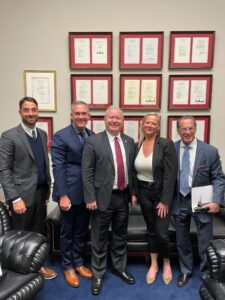
David Schillinger, MD, FACEP
Shanna Howe
Rep. Neal Dunn (R-Fla.)
William Freudenthal, MD, FACEP
Charlie Schuyler
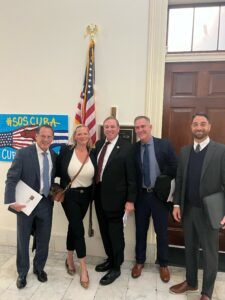
Charlie Schuyler
William Freudenthal, MD, FACEP
Rep. Larry Bucshon (R-Ind.)
Shanna Howe
David Schillinger, MD, FACEP
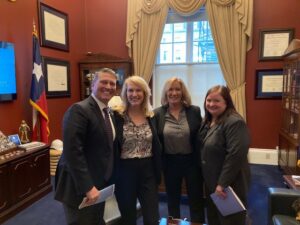
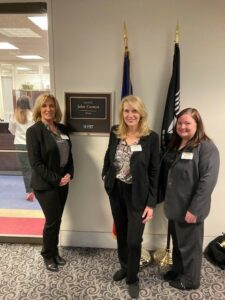
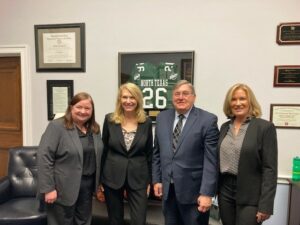



David Schillinger, MD, FACEP
Shanna Howe
Rep. Neal Dunn (R-Fla.)
William Freudenthal, MD, FACEP
Charlie Schuyler

Charlie Schuyler
William Freudenthal, MD, FACEP
Rep. Larry Bucshon (R-Ind.)
Shanna Howe
David Schillinger, MD, FACEP




On Wednesday, October 19, 2022, EDPMA filed an amicus brief in support of the plaintiffs in Texas Medical Association, Dr. Adam Corley, and Tyler Regional Hospital, LLC, v. United States Department of Health and Human Services, Department of Labor, Department of the Treasury, Office of Personnel Management, and the current heads of those agencies in their official capacities.
The press release can be found here and the amicus brief with exhibits can be found here.
FOR IMMEDIATE RELEASE
EDPMA Files Amicus Brief Holding Federal Regulators Accountable To Implement the No Surprises Act As Required By Law
McLean, Virginia – The Emergency Department Practice Management Association (EDPMA) filed an amicus brief today in support of the Texas Medical Association (TMA), Dr. Adam Corley and Tyler Regional Hospital, LLC’s lawsuit against federal regulators challenging the implementation of the No Surprises Act (Rule) that clearly favors health plans.
Last fall, EDPMA, and the Virginia and Texas College of Emergency Physicians filed an amicus brief in support of TMA’s first lawsuit challenging federal regulators on the process to resolve reimbursement disputes between insurance plans and physicians, with special emphasis on the adverse effects the Rule threatens on the delivery of emergency care. The TMA plaintiffs won this lawsuit.
The court ruled that the NSA was not ambiguous and required that all the factors listed in the statute should be considered in determining the final payment amount. In the settled TMA case, the court clearly stated that the methodology used by health plans to calculate the QPA was incompatible with the No Surprises Act.
However, nothing really changed regarding how arbitrators resolved billing disputes between healthcare plans and physicians. In fact, arbitrators continue to unfairly skew independent dispute resolution (IDR) results in favor of insurers.
“EDPMA fully supports claims in the TMA lawsuit that simply ask that the No Surprises Act be followed as written so that the arbitrators charged with resolving payment disputes would not anchor the payment amount to the QPA and that their decision making is rooted in the statute. If the current final rule and de-facto benchmark standard goes unchecked, emergency medicine physicians, their practices and their value as our nation’s healthcare safety net are in jeopardy. Access to emergency care – which was vital to assisting our country through the pandemic – will be compromised with fewer resources to emergency care while the health plans then and now continue to post record profits,” says Don Powell, DO, FACEP, EDPMA Chair of the Board.
EDPMA will continue to advocate for emergency medicine physicians and their practices to ensure fair reimbursement to protect patients and their in-network choices.
About EDPMA:
EDPMA is the nation’s only professional physician trade association focused on the delivery of high quality, cost-effective care in the emergency department. EDPMA’s membership includes emergency medicine physician groups of all sizes, as well as billing, coding, and other professional support organizations that assist healthcare providers in our nation’s emergency departments. Together, EDPMA’s members deliver or directly support health care for approximately half of the 146 million patients that visit U.S. emergency departments each year.
Contact:
Cathey Wise
703.506.3282 (direct) l 817.905.3310 (cell)
cathey.wise@edpma.org
Filed 10/20/2022
On Wednesday, October 19, 2022, EDPMA submitted a response to the request for Information on the Medicare Access and CHIP Reauthorization Act of 2015 (MACRA). In the letter, EDPMA calls on Congress to begin the process of reform as soon as possible by convening roundtables with affected stakeholders and/or hearings in the Committees of jurisdiction to inform potential legislative solutions, highlighting reimbursement instability and MIPS and APMs as areas to address.
The letter can be found here.
On Monday, September 26, 2022 EDPMA sent a letter to Reps. Bera and Bucshon thanking them for introducing HR 8800, Supporting Medicare Providers Act of 2022, and in support of the bill. The letter can be found here.
The Centers for Medicare and Medicaid Services (CMS) recently issued two rulemaking vehicles to implement the new facility enrollment designation of Rural Emergency Hospitals (REHs) as created by Congress when it passed the Consolidated Appropriations Act, 2021. The statutory provision allows for the establishment of REHs by essentially allowing already-existing critical access hospitals (CAHs) and certain rural hospitals to convert to REHs. Eligible facilities will be able to enroll as REHs under statute for January 1, 2023 services. In preparation for the rules, EDPMA created a work group tasked with developing policies and requests for changes where needed. As a result of these efforts, EDPMA responded to both REH proposed rule comment solicitations:
You can review the full EDPMA response to the REH CoP proposed rule here.
The full EDPMA CY 2023 OPPS comment letter on these REH provisions is available here.
On Tuesday, September 6th, EDPMA submitted its comment letter responding to proposals included in the calendar year (CY) 2023 Medicare Physician Fee Schedule (MPFS) proposed rule. The MPFS proposed rule is issued by the Centers for Medicare and Medicaid Services (CMS) and sets health care professional payment rates and other policies, including quality reporting requirements, for the upcoming calendar year. In addition to addressing the planned cuts to the CY 2023 MPFS conversion factor and other downward pressures on Medicare physician payments, key highlights from the CY 2023 MPFS EDPMA comment letter include:
In the proposed rule, CMS stated,
At 86 FR 65162, we stated in error, “Similar to our proposal for split (or shared) prolonged visits, the billing practitioner would first report CPT code 99291 and, if 75 or more cumulative total minutes were spent providing critical care, the billing practitioner could report one or more units of CPT code 99292.” We intended to state that CPT code 99292 could be billed after 104, not 75, or more cumulative total minutes were spent providing critical care. As correctly stated elsewhere in the CY 2022 PFS final rule (regarding critical care furnished by single physicians at 86 FR 65160, and regarding concurrent care furnished by multiple practitioners in the same group and the same specialty to the same patient at 86 FR 65162), our policy is that CPT code 99291 is reportable for the first 30-74 minutes of critical care services furnished to a patient on a given date. CPT code 99292 is reportable for additional, complete 30-minute time increments furnished to the same patient (74 + 30 = 104 minutes). We clarify that our policy is the same for critical care whether the patient is receiving care from one physician, multiple practitioners in the same group and specialty who are providing concurrent care, or physicians and NPPs who are billing critical care as a split (or shared) visit.
EDPMA forcefully opposed this uncalled for change and urged CMS to withdraw the proposal as it is confusing and would result in guidance that departs from well-recognized, long-standing CPT critical care “time” policy.
The full EDPMA comment letter is available for review here. The CY 2023 MPFS final rule is expected around November 1, 2022 with most provisions effective January 1, 2023.
Virtual Workshop:
Full Reset: Keys to a Successful Transition to the 2023 Documentation Guidelines
Tuesday, October 25
1p – 4p EST
The new Documentation Guidelines represent generational change for emergency medicine and EDPMA wants you and your team to be prepared!
This workshop (complete with case studies) is geared for associate and senior coders, business managers and billing companies in a train-the-trainer format. Of course, all are welcome!
In this virtual workshop, you will:
• Understand key principles of 2023 Documentation Guidelines for Emergency Medicine
• Review best practice and approach to change management for the RCM organization
• Discuss case studies comparing old and new guidelines.
Curriculum & Faculty
Train the Trainer: Key Take Home Points for the 2023 Documentation Guidelines
Diana Tellefsen, CPC, CEDC – Brault
Brittany Rulison – Brault
Change Management and Keys to a Successful Transition
Juli Forde-Smith – ZOLL Data
Panel Discussion: Chart Reviews and Case Studies
Jacquie Bratcher CPC, CEDC – R1 RCM
Maria Douglas CPC, CEDC, CPMA, OHCC – Ventra Health
Moderated by Dr. Jason Adler, MD, FACEP, FAAEM
Registration Fees:
Members: $150
Non-Members: $300
Register
On Tuesday, September 13, 2022, EDPMA submitted comments to CMS on 2023 Hospital Outpatient Prospective Payment System (OPPS) and Rural Emergency Hospitals (REH) proposed rule. The letter focused on REH provisions. The letter can be found here.
On Monday, September 12, EDPMA sent a letter to congressional committee leaders requesting that Congress act before the end of the year to mitigate expected Medicare Physician Fee Schedule (MPFS) cuts in calendar year 2023. EDPMA is asking Congress to address the short-term issue of stabilizing Medicare reimbursement in 2023 by increasing the Medicare CF in 2023 by at least 4.5 percent, waiving the 4 percent PAYGO cut, and providing an inflationary update based on the Medicare Economic Index (MEI). EDPMA is also urging Congress to work towards a long-term solution to provide an annual inflationary update to provide greater stability for physicians participating in the Medicare program and their patients. The letter can be found here.